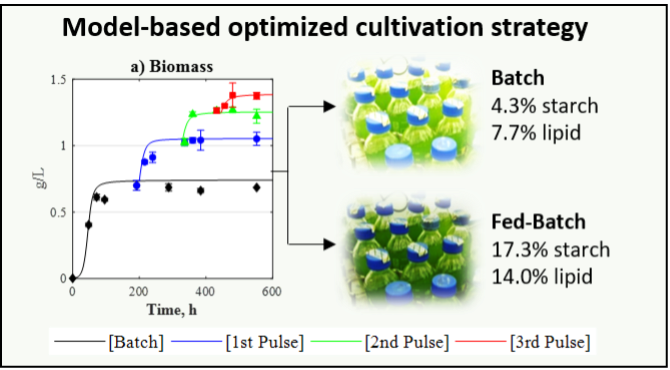EnhanceMicroaAlgae partners at the University of Manchester have developed a new mixotrophic cultivation strategy that produces enhanced biomass growth as well as significantly increased lipid and starch production based on a pulse feeding strategy. In addition, they have developed a new model of the process which they have used to optimise the feeding strategy to obtain maximum starch and lipid productivities.
Their work entitled “A highly productive mixotrophic fed-batch strategy for enhanced microalgal cultivation” was recently published in Sustainable Energy & Fuels (IF= 6.18) and is available in Open Source.
Microalgal biomass offers great opportunities for green energy generation within emerging biorefinery frameworks. However, the conventional cultivation of microalgae in phototrophic batch systems, which typically yield low biomass productivities, is unfit for large-scale applications. Fed-batch cultivation, on the other hand, represents a more reliable strategy for sustained biomass growth. This work presents a highly productive fed-batch cultivation strategy consisting of intermittent pulses of organic carbon that promotes microalgal growth in mixotrophic mode whilst favouring the formation of starch and lipid metabolites, which have various applications for fuel and high value-added chemicals. Using a combined experimental and modelling approach, the fed-batch pulse feeding regime was additionally optimised for maximal starch and lipid formation, resulting in a 3-pulse strategy which yielded substantial increases of 94% biomass, 676% starch, and 252% lipids with respect to a standard batch scenario. This fed-batch strategy represents a promising cultivation strategy fit for sustainable biofuel production.
Read this paper here.

